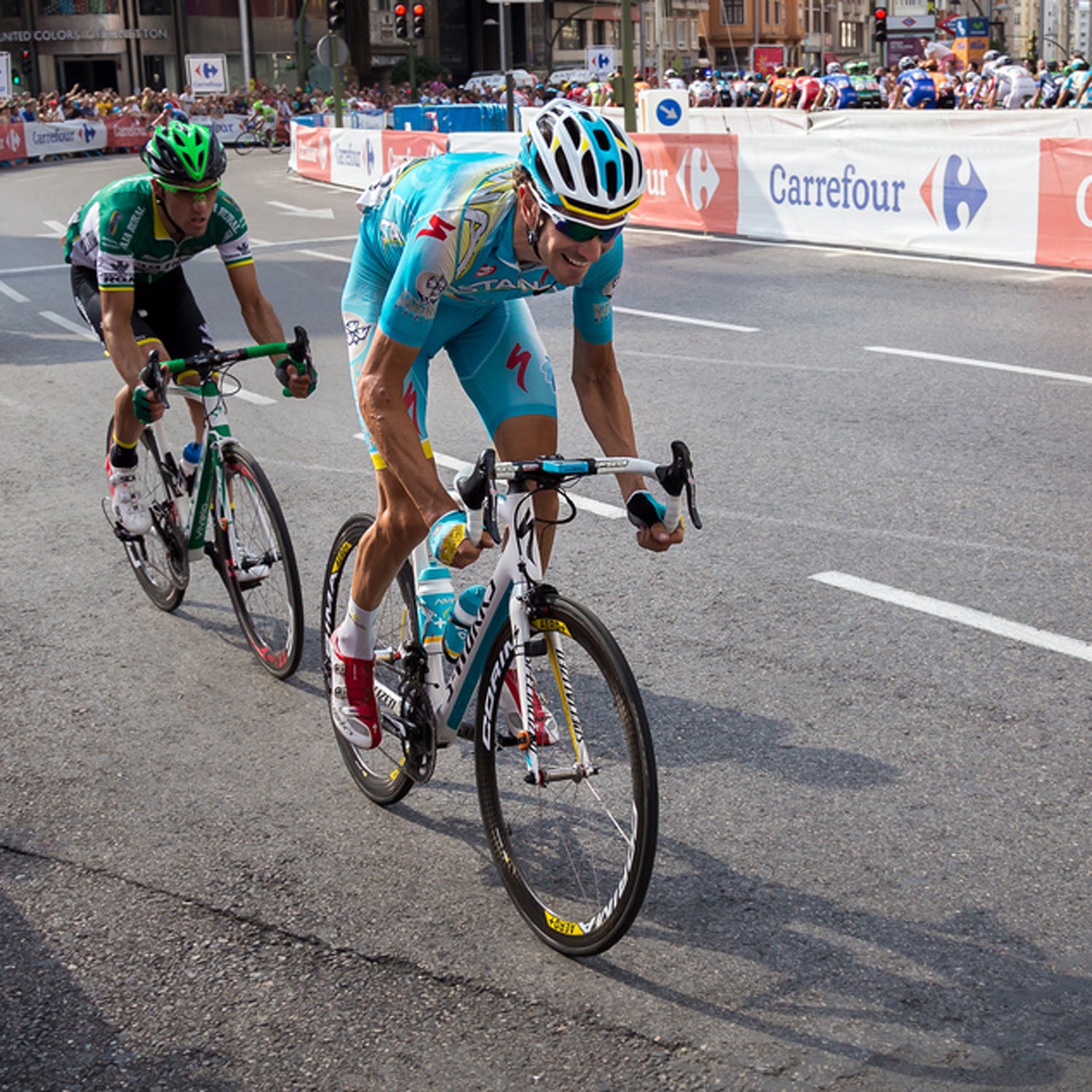Let’s be honest: this is not exactly a surprise.��
On Friday, bike racing’s governing body, the Union Cycliste Internationale, . If granted, that would mean that Vincenzo Nibali may not be able to defend his win at the 2014 Tour de France. It could even mean that the team shuts down entirely.
But while some in the cycling community expressed surprise at this request, given that the team was granted a license back in December, a close look at events shows pretty clearly that this was a likely, if not inevitable, scenario. It also serves to vindicate UCI President Brian Cookson who was pummeled by the media—a�Ի� ���ܳٲ������—for not taking a harder stance against Astana and doping. But a more careful review of his comments makes clear that he was playing the long game.��By methodically following the rules and protocols instead of jumping to try to deny a license for Astana via dubious executive fiat, Cookson may have outmaneuvered the team and positioned the UCI to send an important message about doping in cycling.
“For me, it was very frustrating, but we had to work with the legal tools and I had to accept that,”����Gazzetta dello Sport��in December, when the License Commission provisionally approved Astana for 2015, despite a recent run of five positive doping tests by riders on the Pro Team and affiliated development outfit.
“But the game isn’t over,” he added. “I’m still determined to act, professionally and legally, once the dossier from Padova has been received.”
Cookson was referring to an Italian criminal investigation into doping, which was said to implicate riders and staff on the Astana team. At the time the License Commission provisionally granted Astana’s 2015 license, it wasn’t in possession of those documents.��As the UCI’s statement Friday made clear, they are now.
But the Padova documents aren’t the only evidence in hand. Among the conditions Astana agreed to in return for its license was an independent audit of the team’s anti-doping policies and practices, as well as its management structure, by the .
Astana has never been a modern team in the sport, at least not in the innovating sense we think of when it comes to teams like Sky. It was even born out of the 2006 collapse (in a doping scandal) of one of the sport’s hoariest institutions, Manolo Saiz’s former Liberty-Seguros-Wurth team.
As the UCI noted, the recently received report came to some troubling conclusions. “After careful review of this extensiveve report, the UCI strongly believes that it contains compelling grounds to refer the matter to the License Commission and request the Astana Pro Team license be withdrawn,” the organization said in its press release Friday.
The UCI hasn’t published the audit, and it hasn’t said it will. But it hinted at one of the findings: specifically that the policies and structures the Lausanne audit found were markedly different than the ones Astana portrayed at its December hearing before the License Commission.
Astana has never exactly been a modern team in the sport, in the innovating sense we think of in terms of teams like Sky or Cannondale-Garmin. The team itself was born out of the 2006 collapse (in a doping scandal) of one of the sport’s hoariest institutions, Manolo Saiz’s former Liberty-Seguros-Wurth team, which started as ONCE back in 1989. ��
Since 2006, Astana has had no less than four different general managers, and has regularly been beset by doping scandals. But its ethically flexible approach, at least in terms of its current situation, can probably best be understood in context of , who raced four seasons on Astana, from 2011 to 2014. ��
Kessiakoff retired last December, after a truly awful 2014 season of injury and illness. But, speaking to Malena Johannson, he said that many of his health issues were made worse by team management.
Some examples: Kessiakoff says he was forced to race while injured, that team doctor decisions to send him home were overruled by management, and that management, specifically General Manager Alexandre Vinokourov, sent communications that Kessiakoff took as threats, warning that he needed to perform better or the team would take action.
Kessiakoff’s takeaway was that maybe he should dope. It “would have been an easy way to make my problems disappear,” he said. “Dope and start racing fast, and the team would have been happy.”
That should give anyone chills who gives a damn about clean sport, as job pressure is one of the clearest incentives to dope. You can take Kessiakoff’s comments with some skepticism; he raced for the team for four seasons and his complaints seem to only refer to last year, when he was often hurt. But if he is right—a�Ի� none of the quotes in the VeloNews story from lead Directeur Sportif Giuseppe Martinelli really refute Kessiakoff’s claims—the message Vinokourov was sending last year was subtle but clear: we don’t care if you’re hurt. Perform to our expectations, or you’re out.
Now, add that to what we know of Astana. Two riders, . Three other riders, on the affiliated Astana Continental team, tested positive for steroids. One, when busted, was riding for the Pro Team on a “stagiaire” contract, or tryout.
Last year, the over anomalies in his bio-passport that date to his time on Astana (he now races for Tinkoff-Saxo Bank). That case is pending an appeal to the Court of Arbitration for Sport. There was the Alberto Contador positive in 2010, that saw his Tour de France title stripped. There was Vinokourov’s own memorable positive, in 2007, for blood doping (one of two on the team).
It “would have been an easy way to make my problems disappear,” ex-pro Astana racer Fredrik Kessiakoff��said. “Dope and start racing fast, and the team would have been happy.”
The UCI’s Cookson knows all of this and seems to see the pattern clearly. And his response to last December’s license decision made abundantly clear that while his hands were effectively tied at the moment, if Astana screwed up this much, he’d drop the hammer on them.
The hammer is coming down, it seems.
If the UCI has what it says it has—which is hard to know from the generalities, but would indicate some pretty substantive��evidence of shenanigans—then it’s hard to see a way out of this for Astana.
The License Commission has three basic choices in front of it: It can decline the UCI’s request and let the team race on; it can revoke the Pro Team license but let Astana apply for a second-tier Pro Continental license; or it can level the UCI’s equivalent of the NCAA Death Penalty and revoke the license entirely, at which point the team is done, at least for 2015.
The UCI takes great care to point out that the License Commission is independent; it could rebuff the request. But I doubt it. More likely are the other scenarios.
There, it’s laughable to think that the ethical transgressions that would support a revocation of a Pro Team license would somehow be acceptable for a team at the Pro Continental level. But the other solution—a wholesale withdrawal which makes the team fold—presents its own problems. In that event, expect Astana to wage outright war on the UCI, with an appeal filed to CAS and likely multiple other appeals from riders or even staff who would be instantly put out of work. ��
It is, after all, late February and the season is over a month old. Astana’s already won two races. Can you really take us out of the sport now, they will ask? Incidentally, that’s the rationale offered up by who tweeted today that he wasn’t a fan of Astana, but the way the UCI was handling it wasn’t appropriate, and it was far too late to act now.
Based on the timeline from the only other similar case to come before CAS, a 2012-2013 offseason dispute when the UCI attempted but failed to��deny the Katusha team a license—based on the team’s pattern of anti-doping violations the previous four seasons and the presence of riders and staff with past doping convictions—I’d expect a License Commission decision in less than two weeks, and a ruling on any CAS appeal within about two months after that.
Even that accelerated timeline would put a final decision uncomfortably late in the season, possibly even during the second-biggest race on the calendar, the Giro d’Italia. In this respect, Tinkov is correct. It would look absurd. It will be painful.
But if the UCI is correct and Astana was deeply tied to doping as recently as last season, it may also be necessary. Tinkov’s argument, which he is not alone in voicing, presents a kind of false choice.
Sure, it’s easy to argue that mid-season is no time to open a case like this. But let’s try the alternate scenario: the UCI is in possession of material evidence that suggests Astana is tied to doping—tied clearly enough that maybe it shouldn’t be in the sport at all—but waits until the next offseason to act. What would be the reaction when that news got out?
Yes, leadership at the UCI is different than in the Katusha case. But they’re mindful of the lessons from that episode: namely that you’ve gotta do things exactly by the rules (even when, arguably, the rules themselves could use a refresh). Katusha didn’t win that case so much as the UCI lost it in part by mismanaging the situation. Expect a different approach this time.��
If the UCI pursues a case like Astana’s during an active season, it sends a pretty important message to the rest of the teams (and riders): we won’t wait to do what we think is the right thing. We won’t wait even if it causes some short-term pain and confusion, if we believe it’s in the best interest of the sport.��
How prevalent is doping today? Estimates vary, but a recent anonymous poll of pro riders by Sporza provides a guide of sorts. Sporza surveyed 90 current Belgian pros. Of the 54 respondents, 16 percent said that it was not possible to win a Grand Tour without doping. Just 35 percent thought it possible and half had no opinion. It’s a small sample, but a knowledgeable one.
Not many years ago, Bob Stapleton, then of the HTC-Columbia team, told me that pro cycling was in a kind of existential fight. On one side were teams actively fighting to clean up the sport. On the other were teams actively trying to enforce omertá and stop only the coverage of doping, not the doping itself. And in the middle was the majority of teams, who could go either way, just so long as they knew what the rules—the unspoken, unwritten rules that, in terms of doping, have always governed the sport—were.
By pursuing the Astana case now, the UCI is sending a message to the teams, and I doubt Astana is the only team the UCI has its eye on. The message: these are the rules, written and not implied. We’re following them; we expect you to as well.


